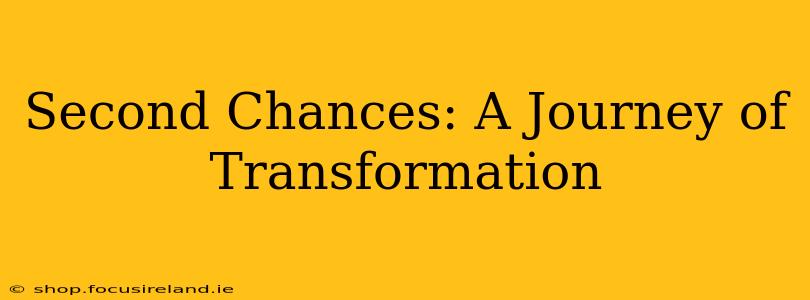Second chances. The very phrase evokes a sense of hope, redemption, and the possibility of a fresh start. Whether it's a personal setback, a professional misstep, or a relationship gone wrong, the opportunity for a second chance can be transformative. But what exactly does this journey entail? How can we learn from our mistakes and use them as stepping stones toward a better future? This article delves into the multifaceted nature of second chances, exploring the challenges, rewards, and the crucial steps involved in navigating this powerful process.
What does a "second chance" actually mean?
A second chance isn't simply about erasing the past; it's about acknowledging it, learning from it, and actively creating a different path forward. It's about recognizing the mistakes made, understanding the underlying causes, and consciously making choices that lead to positive change. This could manifest in various forms – a renewed relationship, a career pivot after a layoff, or overcoming a personal addiction. The core element is the commitment to personal growth and a willingness to embrace change.
How can I learn from my mistakes and use them as stepping stones?
This is arguably the most crucial aspect of embracing a second chance. Self-reflection is paramount. Instead of dwelling on regret, actively analyze what went wrong. Identify patterns of behavior or thinking that contributed to the negative outcome. Journaling, therapy, or simply having honest conversations with trusted friends or family members can facilitate this crucial self-assessment. Once you understand the root causes, you can develop strategies to prevent similar situations from arising in the future. This process of learning and growth is essential for genuine transformation.
Is it possible to get a second chance after making a big mistake?
Absolutely. The magnitude of the mistake doesn't define the possibility of a second chance; rather, it's the willingness to take responsibility, make amends (where appropriate), and demonstrate genuine change that determines the outcome. It requires humility, perseverance, and a demonstrable commitment to a better future. This might involve seeking forgiveness, making reparations, or dedicating oneself to positive actions that counteract the negative impact of the past mistake. Remember, genuine remorse and a demonstrable commitment to change are key.
How can I forgive myself after making a mistake?
Self-forgiveness is a vital, often challenging, component of the journey. It requires self-compassion and a realistic understanding that everyone makes mistakes. Instead of harsh self-criticism, focus on the lessons learned and the steps you're taking to create a better future. Practicing self-care, engaging in activities that bring you joy, and seeking support from others can all contribute to the process of self-forgiveness. Remember, progress, not perfection, is the goal.
What are the benefits of embracing second chances?
Embracing second chances offers profound benefits. It fosters personal growth, resilience, and increased self-awareness. It strengthens relationships by demonstrating accountability and commitment. It allows for the pursuit of new opportunities and the achievement of previously unattainable goals. Ultimately, embracing a second chance leads to a more fulfilling and meaningful life, built on a foundation of learning and growth.
How can I create a plan for a better future?
Creating a plan involves setting clear goals, defining actionable steps, and establishing a timeline for achieving those goals. This requires breaking down larger goals into smaller, manageable steps, setting realistic expectations, and celebrating milestones along the way. Seeking guidance from mentors, coaches, or therapists can provide invaluable support and structure during this process. Regular review and adjustments to the plan are vital to ensure it remains relevant and effective.
Conclusion:
The journey of transformation offered by second chances is a powerful testament to human resilience and the capacity for growth. It requires self-reflection, accountability, and a unwavering commitment to positive change. While the path may be challenging, the rewards – personal growth, stronger relationships, and a more fulfilling life – are immeasurable. Embrace the opportunity for a fresh start, learn from the past, and create a future filled with purpose and meaning.

